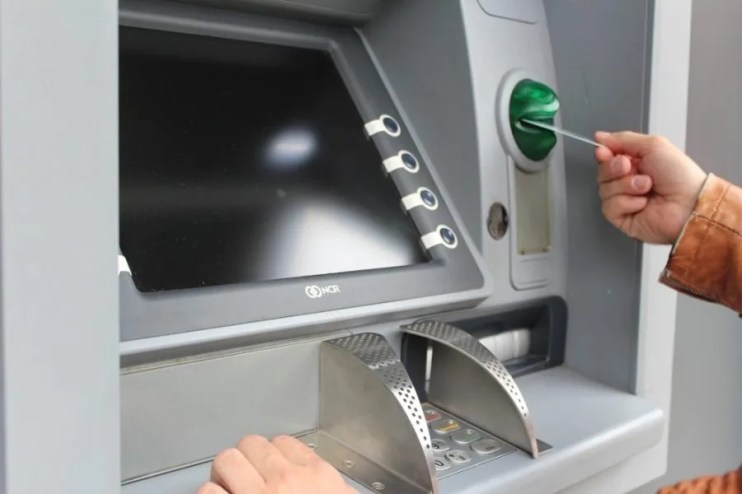Link chief John Howells on bank branch closures, payments and the battle for cash

When was the last time you found yourself without a credit card or Apple pay, desperately searching for coins in your pockets to pay for something? Or the last time you were on the hunt for a cashpoint, unable to pay for essentials without one?
Probably a very long time ago, to be honest. Cash has been in terminal decline for years and that drop-off was spurred on by covid lockdowns, which fuelled a sharp drop-off in cash usage and triggered a push by the big retail banks to scale back their physical footprints.
But that inexorable shift may be in danger of leaving swathes of vulnerable people cut off from the payments system entirely.
“We’ve got about 55 million people [in this country] who are very happy using their iPhones and digital payments. But we’ve got about five million who are heavy cash users,” the chief of the UK’s ATM network Link John Howells, tells City A.M. in an interview.
“If cash stopped being available or stopped being accepted, we’d have enormous hardship for five million people – that’s far too big a group of the community to abandon.”

Cash campaign
Link is the largest interbank network in the UK and operates the country’s 70,000 cash points. Its machines have fuelled the economy in Britain’s towns, high streets and villages for decades but now face an existential threat.
That threat has turned a large part of its role into a campaigning one. While rural villages and towns may seem a world away from the boardrooms of the big lenders in London, Howells says his job is to join the dots and remind those banks of the stragglers left behind the more structural trends in the economy.
“It’s a very different world from a city centre to a rural village or somewhere [in] Northern Ireland, rural Scotland, Devon and Cornwall,” he says. “When you go out [of the cities], you’ve got […] high streets who are heavy cash users, consumers who are reliant on cash – retired and less well paid people.”
That position can put the network at loggerheads with its members at times – particularly the UK’s big lenders – who are on a mission to slash costs, cull branches and invest as much cash as possible in their digital offerings.
More than half of the UK’s bank branches, some 5162, have already been wiped out since 2015, according to consumer group Which?, meaning that free ATM usage has disappeared with them. The move to slash the footprint also shows no signs of slowing and a further 206 branches are set to close by the end of 2023.
Digital shifts
Funding the ATM network and Link as an organisation costs its 34 members £358m and £15m every year, respectively. The fees are based on usage, meaning the big retail banks are paying the lion’s share of the fees as it’s their customers largely still withdrawing money.
The newer crop of digital first banks meanwhile, whose customers are not in need of branches and cash points, have opted out of the networks and saved themself hefty costs.
And those fees levied for the ATM upkeep look increasingly large given the scale of cash usage. British shoppers used cash in just 15 per cent of transactions in 2021 – the most recent full year data. That figure was half the level of the year before and down from nearly 40 per cent before the pandemic, the British Retail Consortium found.
Howell’s fear is that banks may decide to pull out and defund the network before the population is entirely ready to shift to digital.
“We’ve got 34 members of Link, and at any one point there’ll be some thinking about, ‘can we save costs’, ‘can we reduce our cash costs’. But the thing about a payments network is everybody’s got to be in it or it doesn’t work,” he says.
“Because if one goes, that means all the others are paying for the ATM network and the customers of the one [get a] free ride.”
Novel solutions
Howells mission though was given a major boost by the inclusion of an amendment to the financial services and markets bill which will enshrine access to cash in law and allow regulators to clampdown on lenders and across the country.
“Before the legislation was coming in, we were walking blindfolds to the blind to a cliff edge,” he says.
Link’s solution alongside that legislative reform is now to roll out a host of Post Office-led pseudo bank branches across the country that can plug the gap left by lenders when the last branches in a particular location closes, funded by the banks. The branches are already popping up across the UK and one was recently rolled out in West London in Acton.
But even with those solutions in place, he argues the problem will rear its head again as digital transformation moves on at pace. He says the government needs to do more to roll the turf as digital payments takeover completely
“When we turned off analogue TV and switched it to digital 15 years ago, policymakers recognised you had to have a national programme to make sure everybody was able to use it.
“We need the same with digital payments – we need to have a national programme to make sure that we can get everybody using digital payments over the next decade.”
Link, he believes, will become redundant in its current form in the next twenty years as cash is phased out. Then it will likely move onto a digital inclusion campaign as the next wave of payments innovation comes around.
“We’re not here to lobby for cash,” he says. “Our job is to make sure that the consumers who still rely on it don’t suddenly find it collapses and disappears.”